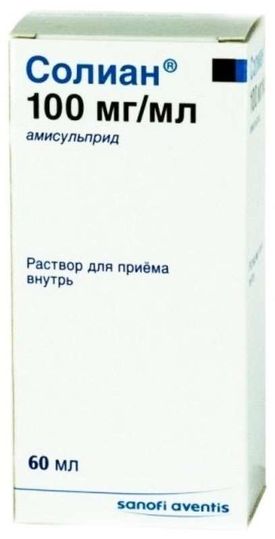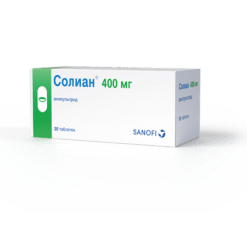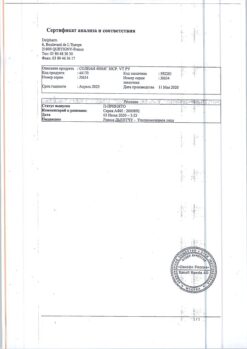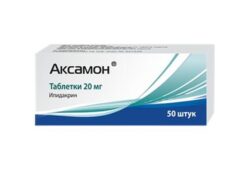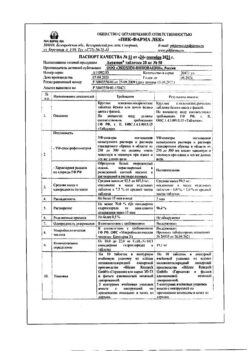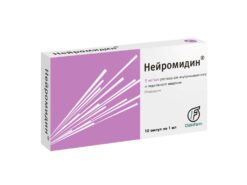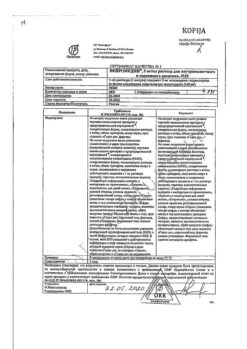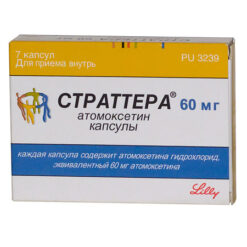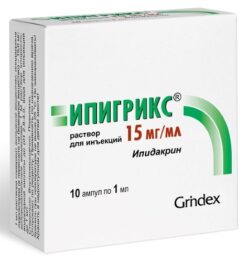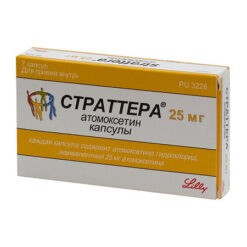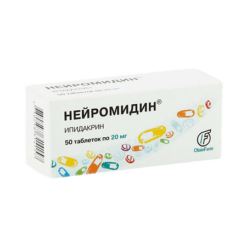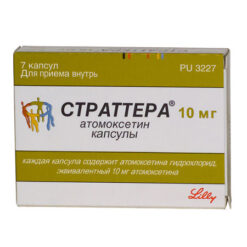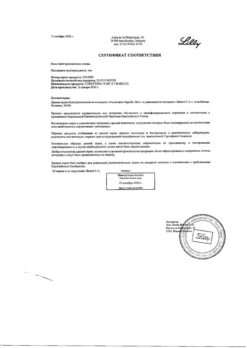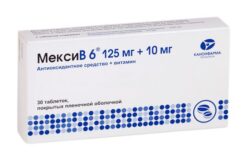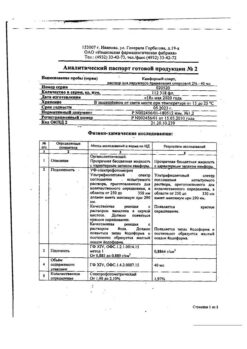No products in the cart.
Solian, 100 mg/ml 60 ml
€145.64 €121.37
Description
Amisulpride has a high selective affinity for dopaminergic receptors of subtypes D 2 /D 3 and no affinity for subtypes D 1, D 4 and D 5.
In contrast to classical and atypical neuroleptics, amisulpride has no affinity for serotonin receptors, histamine H1 -receptors, ?-adrenoreceptors and choline receptors.
When used in high doses it blocks postsynaptic D 2 -receptors localized in limbic structures unlike analogous receptors in striatum. It does not cause catalepsy and does not lead to development of hypersensitivity of dopamine D 2 -receptors after repeated treatment.
At low doses, it predominantly blocks presynaptic D 2 /D 3 -receptors, stimulating dopamine release.
Its atypical pharmacological profile accounts for the antipsychotic effect of amisulpride at high doses resulting from blockade of postsynaptic dopamine receptors and its effectiveness at low doses on negative symptoms resulting from blockade of presynaptic dopamine receptors.
Amisulpride is less likely to cause extrapyramidal side effects, which may be due to its predominant limbic activity.
In patients with schizophrenia with acute seizures, Solian acts on both secondary negative symptoms and affective symptoms (including depressed mood and retardation).
Indications
Indications
Acute and chronic schizophrenia, accompanied by severe productive (including delusions, hallucinations, thinking disorders) and/or negative (including affective flatness, lack of emotionality and withdrawal from communication) disorders, incl. in patients with a predominance of negative symptoms.
Pharmacological effect
Pharmacological effect
Solian is an antipsychotic drug (neuroleptic), has a neuroleptic, antipsychotic effect.
Amisulpride has a high selective affinity for dopaminergic receptors of the D 2 / D 3 subtypes and does not have an affinity for the D 1, D 4 and D 5 subtypes.
Unlike classical and atypical antipsychotics, amisulpride has no affinity for serotonin receptors, histamine H1 receptors, β-adrenergic receptors and cholinergic receptors.
When used in high doses, it blocks postsynaptic D2 receptors localized in limbic structures, in contrast to similar receptors in the striatum. Does not cause catalepsy and does not lead to the development of hypersensitivity of dopamine D 2 receptors after repeated treatment.
In low doses, it preferentially blocks presynaptic D 2 /D 3 receptors, stimulating the release of dopamine.
The atypical pharmacological profile determines the antipsychotic effect of amisulpride in high doses, resulting from blockade of postsynaptic dopamine receptors, and its effectiveness in low doses against negative symptoms resulting from blockade of presynaptic dopamine receptors.
Amisulpride causes extrapyramidal side effects to a lesser extent, which may be due to its predominant limbic activity.
In patients with schizophrenia with acute attacks, Solian acts on both secondary negative symptoms and affective symptoms (including depressed mood and retardation).
Special instructions
Special instructions
It is possible to develop a malignant neuroleptic syndrome, characterized by hyperthermia, muscle rigidity, dysfunction of the peripheral nervous system, and increased levels of CPK. If hyperthermia develops, especially when used in high doses, all antipsychotic drugs (including Solian) should be discontinued.
Since amisulpride is eliminated by the kidneys, in case of severe renal impairment, the dose of the drug and the treatment regimen should be adjusted. There is no experience with the use of the drug in patients with severely impaired renal function (creatinine clearance less than 10 ml/min).
Since the drug is poorly metabolized, dose reduction is not required in case of liver dysfunction.
Due to the possible decrease in the seizure threshold when using amisulpride, patients with a history of epilepsy require constant monitoring during Solian therapy.
In elderly patients, amisulpride should be used with special precautions due to the possible risk of hypotension or excessive sedation.
In Parkinson’s disease, caution should be exercised when prescribing antidopaminergic drugs and amisulpride due to the possible worsening of the condition. Amisulpride should only be used if antipsychotic therapy cannot be avoided.
Amisulpride causes a dose-dependent prolongation of the QT interval, thereby increasing the risk of developing serious ventricular arrhythmias (such as torsade de pointes). Before prescribing the drug, and, if possible, depending on the patient’s clinical condition, it is recommended to monitor factors contributing to the development of arrhythmia: bradycardia (heart rate less than 55 beats/min), hypokalemia, congenital prolongation of the QT interval.
In patients requiring long-term treatment with antipsychotics, an ECG should be performed as part of the initial assessment of the status.
Due to the lactose content in the tablets, the drug is contraindicated in congenital galactosemia, impaired absorption of glucose or galactose, or lactase deficiency.
Effect on the ability to drive vehicles and operate machinery: Amisulpride affects the reaction rate, as a result of which the ability to engage in potentially hazardous activities may be weakened.
Active ingredient
Active ingredient
Amisulpride
Composition
Composition
1 ml contains:
amisulpride 100 mg
Pregnancy
Pregnancy
The safety of amisulpride during pregnancy has not been established.
Therefore, the use of the drug during pregnancy is not recommended, unless the expected benefit to the mother justifies the potential risk to the fetus.
The use of amisulpride during lactation is contraindicated.
Contraindications
Contraindications
– Concomitant prolactin-dependent tumors (including pituitary prolactinoma, breast cancer).
– Pheochromocytoma.
– Severe renal failure (creatinine clearance less than 10 ml/min).
– Combined use with sultopride.
– Combined use with dopaminergic agonists (including amantadine, apomorphine, bromocriptine, cabergoline, entacapone, lisuride, pergolide, piribedil, pramipexole, quinagolide, ropinirole, selegiline), with the exception of patients with Parkinson’s disease.
– Children up to 14 years old.
– Lactation period (breastfeeding).
– Hypersensitivity to amisulpride and other components of the drug.
The drug should be used with caution when:
– Pregnancy.
– Epilepsy.
– Parkinsonism.
– Kidney failure.
– In elderly patients.
Side Effects
Side Effects
From the side of the central nervous system: Often – insomnia, anxiety, agitation; sometimes – extrapyramidal symptoms (including tremor, hypertension, hypersalivation, akathisia, hypokinesia), the intensity of which is usually moderate at maintenance doses, the symptoms are partially reversible without discontinuation of Solian with the help of anticholinergic antiparkinsonian drugs (the incidence of dose-dependent extrapyramidal symptoms remains very low when treating patients with a predominance of negative symptoms with doses of 50–300 mg/day); rarely – daytime drowsiness; very rarely – acute dystonia (including spastic torticollis, oculogyric crises, trismus), which is reversible and corrected with the help of antiparkinsonian drugs; with long-term use – tardive dyskinesia, characterized by rhythmic, involuntary movements mainly of the tongue and/or face (antiparkinsonian drugs are ineffective and may cause worsening of symptoms); in isolated cases – neuroleptic malignant syndrome, convulsive seizures.
From the digestive system: Rarely – constipation, nausea, vomiting, dry mouth; in some cases – increased activity of liver enzymes (mainly transaminases).
From the endocrine system: Often – an increase in the level of prolactin in the blood plasma (reversible after discontinuation of the drug), which can cause galactorrhea, amenorrhea, gynecomastia, swelling of the mammary glands, impotence, frigidity, as well as weight gain.
From the cardiovascular system: Rarely – arterial hypotension, bradycardia, prolongation of the QT interval; very rarely – atrial fibrillation.
Other: In some cases – allergic reactions.
Interaction
Interaction
Combinations that are contraindicated: With dopaminergic agonists (including amantadine, apomorphine, bromocriptine, cabergoline, entacapone, lisuride, pergolide, piribedil, pramipexole, quinagolide, ropinirole, selegiline), with the exception of patients with Parkinson’s disease. Dopaminergic agonists and antipsychotics exhibit mutual antagonism. For extrapyramidal syndrome caused by antipsychotics, anticholinergic drugs should be used instead of dopaminergic agonists. When Solian is used simultaneously with sultopride, the risk of ventricular arrhythmias, especially atrial fibrillation, increases.
Combinations that are not recommended: With drugs that can cause pirouette-type arrhythmias: class Ia (including quinidine, hydroquinidine, disopyramide) and class III antiarrhythmic drugs (including amiodarone, sotalol, dofetilide, ibutilide), some neuroleptics (including thioridazine, chlorpromazine, levomepromazine, trifluoperazine, cyamemazine, sulpiride, tiapride, pimozide, haloperidol, droperidol) and other drugs (including bepridil, cisapride, difemanil, IV erythromycin, mizolastine, IV vincamine, halofantrine, sparfloxacin, gatifloxacin, moxifloxacin, pentamidine, iv spiramycin). The risk of ventricular arrhythmias increases, especially the development of pirouette-type arrhythmias. If a combination of drugs cannot be avoided, monitor the QT interval and begin ECG monitoring before prescribing. Ethanol enhances the sedative effects of neuroleptics. The consumption of alcoholic beverages and the use of medications containing alcohol should be avoided. The mutual antagonism of the effects of levodopa and antipsychotics should be taken into account when prescribing these drugs. In patients with Parkinson’s disease, it is recommended to use the minimum effective doses of both drugs.
Combinations requiring special caution: With drugs that cause bradycardia (including beta-blockers / except sotalol / calcium channel blockers that cause bradycardia – diltiazem and verapamil), clonidine, guanfacine, digitalis preparations, cholinesterase inhibitors (including donepezil, rivastigmine, tacrine, ambenonium, galantamine, pyridostigmine, neostigmine). With drugs that can cause hypokalemia (including potassium-sparing diuretics, laxatives, IV amphotericin B, glucocorticoids, tetracosactides). With the above combinations of drugs, the risk of ventricular arrhythmias remains, especially the development of pirouette-type arrhythmias.
Combinations that should be taken into account: With antihypertensive drugs and beta-blockers for heart failure (including bisoprolol, carvedilol, metoprolol) has a vasodilatory effect, increasing the risk of orthostatic hypotension (additive effect). With morphine derivatives (including analgesics, antitussives), barbiturates, benzodiazepines and other anxiolytics, hypnotics, sedative antidepressants (including amitriptyline, doxepin, mianserin, mirtazapine, trimipramine), sedative antihistamines, centrally acting antihypertensives, neuroleptics and other drugs (including baclofen, thalidomide, pizotifen) leads to a pronounced increase in the inhibitory effect on the central nervous system (concentration decreases and poses a danger to vehicle drivers and machine operators).
Overdose
Overdose
Experience with amisulpride overdose is limited.
Symptoms: increased known pharmacological effects of the drug (including drowsiness, sedation, hypotension, extrapyramidal symptoms, coma).
Treatment: in case of acute overdose, a possible combination with other drugs should be studied and the necessary measures should be taken: careful monitoring of the vital functions of the body; ECG monitoring (risk of QT interval prolongation); If severe extrapyramidal symptoms occur, anticholinergic drugs should be prescribed. Hemodialysis is ineffective. There is no specific antidote for amisulpride.
Storage conditions
Storage conditions
At a temperature not exceeding 25 °C
Shelf life
Shelf life
3 years
Manufacturer
Manufacturer
Uniter Liquid Manufacturing, France
Additional information
| Shelf life | 3 years |
|---|---|
| Conditions of storage | At a temperature not exceeding 25 °C |
| Manufacturer | Uniter Liquid Manufacturing, France |
| Medication form | oral solution |
| Brand | Uniter Liquid Manufacturing |
Other forms…
Related products
Buy Solian, 100 mg/ml 60 ml with delivery to USA, UK, Europe and over 120 other countries.

